2023
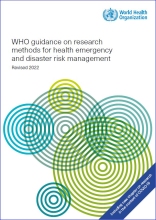
New podcasts and videos on conducting research on Health Emergency and Disaster Risk Management
The WHO Guidance on Research Methods for Health Emergency and Disaster Risk Management is a comprehensive guide on the design, implementation, and reporting of research during and after emergencies and disasters. Involving more than 160 authors in 30 countries, the first WHO textbook on Health EDRM research methods was published in 2021 and updated in 2022 with a chapter on Health EDRM research in the context of COVID-19.
Led by WHO Kobe Centre (WKC) expert Dr. Ryoma Kayano, we collaborated with Evidence Aid and many chapter authors to produce learning materials, including videos, podcasts, webinars, and more, for all 44 chapters.
Find the full set of learning materials here.
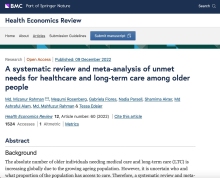
New study: one in four older people have unmet needs for long-term care
In a new study published in Health Economics Review, experts have found that health and social care systems are not adequately meeting the needs of older people worldwide, with one in 10 experiencing unmet needs in healthcare and one in four unmet needs in long-term care.
The study was led by the WHO Centre for Health Development (WHO Kobe Centre) and a researcher based at the Hitotsubashi Institute for Advanced Study at Hitotsubashi University, Japan, in cooperation with the WHO Department of Health Systems Governance and Financing.
The study is the first systematic review and meta-analysis to analyze unmet needs for healthcare and long-term care among older people globally, providing pooled estimates of the prevalence of and leading reasons for unmet needs among older people across countries and socio-demographic groups. The study identified 101 relevant studies from four major databases, published between 1996 and 2020.
Overall, 10.4% of the older population had self-reported unmet needs for healthcare, defined as having foregone or delayed care for a perceived health problem. The most common reasons for unmet healthcare needs were: cost of treatment; lack of health facilities; lack of/conflicting time; health problem not viewed as serious; and mistrust/fear of provider. Significantly, women were more likely than men to experience unmet needs due to cost, with similar results found for those with lower education, lower income, lack of insurance, and poor self-reported health.
Unmet needs in long-term care, where someone has functional limitations but has not received the necessary personal care or assistance, were found to be more prevalent, affecting one in four older people. Rural residents had a higher prevalence of unmet needs in long-term care compared to their urban counterparts.
These findings are crucial to understanding how well health and social care systems are meeting the needs of older people and what gaps remain. As the number of older persons needing medical care and long-term care increases rapidly around the world as the population ages, ensuring affordability of services, reducing geographical barriers to accessing care, and improving the acceptability of services from the perspective of older people, will be critical in reducing unmet need.
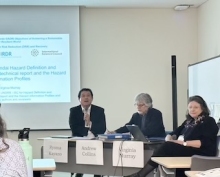
6th Global Summit of Global Alliance of Disaster Research Institute in Kyoto, Japan
The 6th Global Summit of Global Alliance of Disaster Research Institute (GADRI) was held at the Disaster Prevention Research Institute (DPRI) in Kyoto Japan between 15th and 17th March 2023. Global policymakers, practitioners and researchers in disaster risk reduction (DRR) and many cross-disciplinary fields joined the summit and discussed how to systematically identify the processes, techniques, evidence, challenges and opportunities for building sustainable and resilient societies against hazards. Dr Ryoma Kayano, Technical Officer at WKC, joined the summit and shared WHO’s commitment and contribution in DRR to protect population health and well-being. The conference Brochure can be found here.
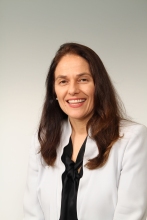
Director’s Note: World Health Day 2023
On April 7th every year, the world observes World Health Day. This day celebrates the unparalleled value of good health and allows us to think about how we can accelerate access to quality Health for All.
This year is special. In 2023, the World Health Organization celebrates its 75th anniversary. This opportunity allows us to look back at the public health successes that have improved the length and quality of life for people around the globe. It’s also an opportunity to consider how we can improve health systems to be responsive to ongoing changes, including health emergencies, epidemics, and population ageing.
Population ageing is a particularly pressing issue. Progressing at a rapid pace worldwide, population ageing affects every country and has profound implications for the progressive achievement of Universal Health Coverage (UHC). Research is key to understanding the range of challenges of progressing towards UHC while countries undergo rapid population ageing.
To accelerate progress towards UHC, the WHO Centre for Health Development (WHO Kobe Centre) developed a simulator to estimate the impact of specific policy options to address the gap between health expenditures and health revenues as populations age. We worked with the local government in Kobe City to study how to improve health systems to manage dementia patients, and these lessons learned are important for other countries facing similar challenges.
We supported research in the Asia Pacific region and recently published a special journal supplement with ten studies about health systems responses to population ageing. Later this year, we’ll be launching a global research consortium for measuring unmet health and social care needs of older people.
We also act as WHO Secretariat for the WHO Thematic Platform for Health EDRM Research Network of over 200 experts, focusing on strengthening health systems in the context of health emergency preparedness.
WKC supports the acceleration of UHC by conducting research and synthesizing evidence about health systems and health emergencies, in light of population ageing. We are committed to carrying out research to inform policy with the support of our donor, the Kobe Group and our research partners.
As we celebrate the achievements that WHO has made over the last 75 years, we hope that our research continues to inform policies that accelerate UHC.
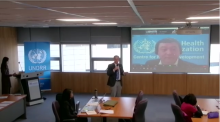
Workshop to systematically identify and evaluate strategies for strengthening community resilience
A multinational workshop as a part of a research project funded by the WHO Kobe Centre (WKC) was held from March 14 to 16, 2023, at the United Nations Office for Disaster Risk Reduction (UNDRR) Global Education and Training Institute in Incheon, South Korea. 21 frontline health and disaster management professionals from 8 countries attended the workshop to identify and evaluate strategies for strengthening community and public health system resilience
Participants explored results from application of the UNDRR Public Health Annex to the Disaster Resilience Scorecard for Cities in Australia, Bangladesh, Brazil, Chile, Japan, Slovenia, Turkey, and United States. The results were consolidated into a series of key actions. These included encouraging broader approaches to public health in disaster risk management, building on lessons from COVID-19 to rapidly scale health services, better understanding ecosystem needs and their impact on resilience, and focusing more on mental health services and wellbeing. Dr Ryoma Kayano, Technical Officer at WKC, attended the workshop and emphasised the importance of disaster risk management to increase resilience in cities based on multisectoral and whole-of-society approach. A news release on UNDRR can be found here.
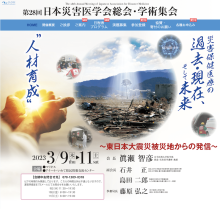
The 28th Annual Meeting of Japanese Association for Disaster Medicine
The 28th Annual Meeting of Japanese Association for Disaster Medicine was held on 9-11 March 2023 in Morioka Iwate, one of the most affected areas by the Great East Japan Earthquake in 2011. With the overarching theme of ‘Human Resource Development in Disaster Medicine’, over 2000 people attended the discussions and seminars on how to progress disaster medicine through exploring perspectives on the past, present and future.
Dr Ryoma Kayano, Technical Officer at the WHO Kobe Centre (WKC), joined a panel group and discussed ‘Evidence in workforce development in the field of Health Emergency and Disaster Risk Management (Health EDRM)’.
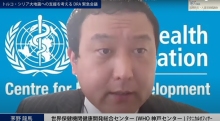
Discussion to reflect experiences from the DRA’s emergency response to the Turkey & Syria earthquake in February 2023
Disaster Reduction Alliance (DRA) is a local consortium, consisting of international agencies, and has been actively involved in disaster risk reduction in Hyogo / Kobe, Japan. An urgent meeting was held by DRA on 9 March 2023 in Hyogo Japan to share the valuable experiences from their activities for preparedness, response and recovery for emergencies and disasters.
Dr Ryoma Kayano, Technical Officer at the WHO Kobe Centre (WKC), presented the role of WHO in disasters and ongoing WKC’s active contribution in the field of Health Emergency and Disaster Risk Management (Health EDRM). In the panel discussion, experts expressed challenges in meeting the immediate health needs of disaster affected populations and discussed how to provide timely and practical support based on experiences with the Great Hanshin-Awaji Earthquake in Kobe, Hyogo.
The video recording of the meeting is available.
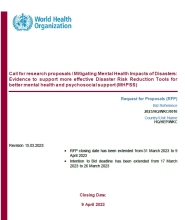
Call for research proposals - Mitigating mental health impacts of disasters
WHO Centre for Health Development (WHO Kobe Centre - WKC) is accepting research proposals - Mitigating mental health impacts of disasters: Evidence to support more effective disaster risk reduction tools for better mental health and psychosocial support (MHPSS).
The Request for Proposals can be found here.
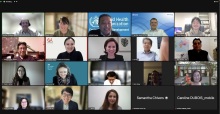
4th Core Group meets to strengthen regional and multidisciplinary collaboration for HEDRM research and practice
Evidence is vital to well-informed decision making in Health Emergency and Disaster Risk Management (Health EDRM). To promote sharing and uptake of knowledge and evidence-based practice in Health EDRM, the WHO Thematic Platform for the Health Emergency and Disaster Risk Management Research Network (Health EDRM RN) was established in 2018. Since its establishment, meetings of the Core Group have been held annually to provide strategic direction for Health EDRM RN.
On 27 October 2022, the WHO Centre for Health Development (WHO Kobe Centre – WKC) convened the 4th Core Group meeting online. 26 WHO and global experts attended and identified a strong need for further global, regional, national, and local collaboration to disseminate knowledge and evidence critical to developing and implementing effective policies and programmes for Health EDRM.
The meeting agreed several key actions for the Health EDRM RN for 2023–2024, including:
- increasing regional and multidisciplinary collaboration for effective dissemination of the WHO Guidance on Research Methods for Health EDRM,
- promoting implementation research to inform evidence-based policies and practices, and
- developing the WHO Health EDRM Knowledge Hub as knowledge platforms.
As the Secretariat of Health EDRM RN, WKC has started planning various activities, including webinars with WHO Regional Offices and new research projects for key research themes. More details about the 4th meeting can be found in the meeting report.
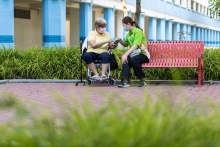
International Women’s Day 2023: the gender aspects of long-term care
March 8 is celebrated as International Women’s Day. This year, the WHO Centre for Health Development (WHO Kobe Centre -WKC) is researching policies about long-term care (LTC) and the impact on women across their lifespans.
LTC faces important gender differentials. As women tend to have longer life expectancies than men, they rely on LTC services. At the same time, women make up the majority of the formal LTC workforce, and female household and community members provide the overwhelming share of informal LTC in homes and communities. Given that informal care is largely unrecognized, informal caregivers face significant losses in foregone wages and other opportunity costs in having to leave the formal workforce to provide care.
WKC is working with the Health Governance and Financing team and the EURO Observatory on Health Policy and Systems to collate evidence for countries about the value of investing in LTC. Sustainable investments in LTC are essential for building equitable communities that support and recognize the health, safety, and welfare of older women and those that care for them.

